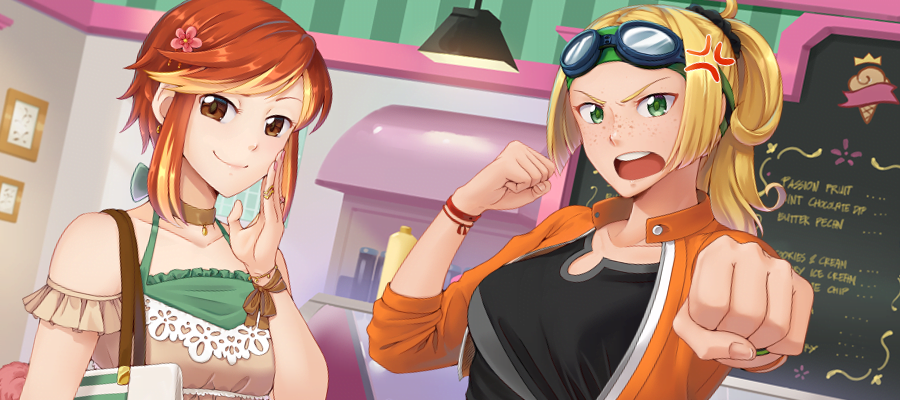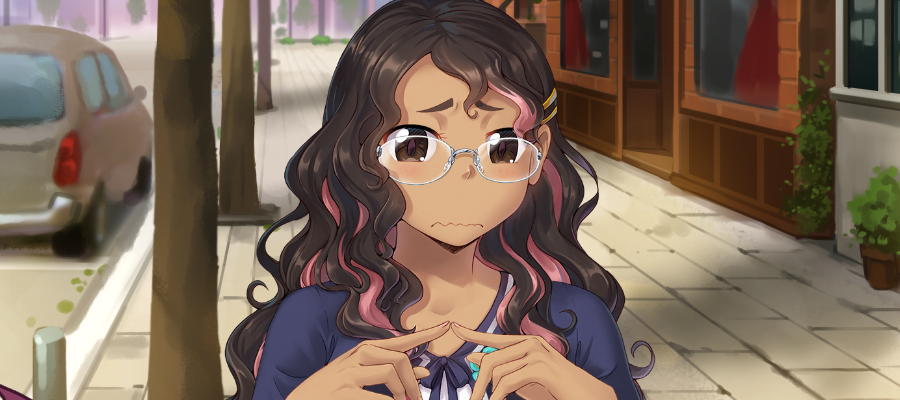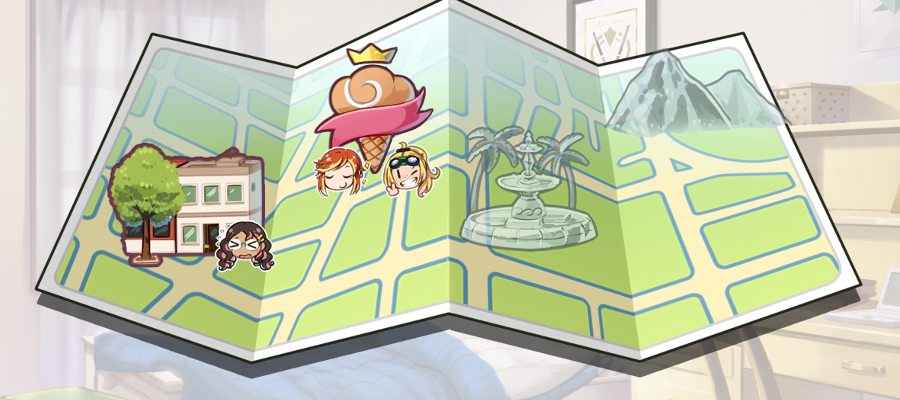DoraKone is a stretch goal kickstarter game that came out in December 2018. When I say it’s a stretch goal, it’s literally a throw-in made for the kickstarter of another, different game, by Apple Cider games. You follow a protagonist named Dulce as she plays an ARG Phone game for exactly one summer, and the people she meets because of it.
This game is an unabashedly self-indulgent, short, easy and breezy little game. There’s no ‘suddenly, you are dead’ in any of the routes I played through, and the game you get is pretty much just Cute Lesbians Start Dating, culminating in a big grand kiss graphic for your trouble. There’s multiple endings and conversation choices, you know, all the classical Visual Novel stuff.

DoraKone is beautiful, just breathtakingly good looking as a visual novel goes. If you’re very familiar with how Renpy works, you know what to expect – the game never busts out a surprising mini game or asks you to do anything I’d consider ‘challenging.’ In the landscape of the modern English Language Visual Novel it’s a very pure, very approachable little nugget of Lesbians.
You can get DoraKone on itch.io for the low low price of No Dollars.

The obvious comparison between this game and any other game is, well, to bring up the association with Pokemon Go. In DoraKone the device of the phone game pulling you together is a properly excellent story device.
See, in Visual Novels there’s a bunch of just narrative stuff that needs to happen to make the story of a Visual Novel work. In the same way that mystery movies need some reason the characters don’t just go to the police, the characters in Visual Novels need something to scaffold them into the situation of dealing with this small group of characters.
Sometimes this reason is magical and sometimes it’s structural. Setting a VN in a school is a pretty easy start and it gives you a predetermined structure, but it does mean your characters are going to skew young. Some VNs don’t care and that’s why there’s this culture of visual novels about 14 year olds who go to the moon or something. DoraKone wants to be about people who are a bit older, on the threshold of university, and it wants to make them new people to you, and so it uses the device of the ARG phone game.
Slavoj Žižek – yes I’m mentioning him of all people here – has talked about the way that Pokemon Go works in the same model as an ideology; it transports the very nature of the world around you, overlaying upon it in a way that changes how you look at everything around you. The pathways and roads of your own hometown are suddenly transformed. You can see this if you’ve any association with PoGo players -they treat each other differently, and the game gives them just enough surface to interact if they want to.
DoraKane use its little Pokemon Go variant as the way of recontextualising the world, as the way to interact with the other girls. This is great because it both lets people immediately become aware of the world they’re in (it’s like now, but with this game you probably have played at least a little of), and it gives you a pre-existing thing to engage with that isn’t your character. You can show the way these characters feel about things by showing how they relate to the game rather than making every engagement about dealing with the player.
Naturally, as a Games Scholar I love this to bits! You can express your character by expressing what they think of the game rather than framing interactions with other players as being judgments of those players. It puts a layer of safety around everything, and that’s a good way to ease characters into knowing one another.

Now, it’s a small thing but I want to shout out how good looking this user interface is. The menu is handled as a phone screen interface, the choice bubbles all stand apart from the text but don’t intrude the way that your classical RenPy user interface does. There’s a lot of stuff in a RenPy game that you might file under ‘good enough, don’t worry about it’ – even Hustle Cat had that subtle air about its save/load screen, for example. In DoraKone, everything is customised and made to fit its soft-edge, nice bubbly button aesthetic. I feel I should send it to Lucy Morris to see what she thinks of it, but it doesn’t have radial menus.
This interface being approachable feels like it plays into the way the game tells its story. Most Visual Novels I’ve tested for this month have had that same ‘navigating a maze’ problem, where I’m left wondering if I’m missing a flag I want to get to do the route I want to do, which can make these games into a sort of lockpicking arrangement. By being short and clear, DoraKone keeps you on path and uses its interface to very clearly direct you to the content you’re trying for.
It’s a very simple game, really – it doesn’t present you with a challenge, just an experience. If you want an experience that’s full of talking about a dragon phone game and listening to people as they show you who they are thanks to games, though, DoraKone is a really good one.
If you’re after boys, sorry, there’s one in the game, he’s gay, and he’s kind of a dick.
